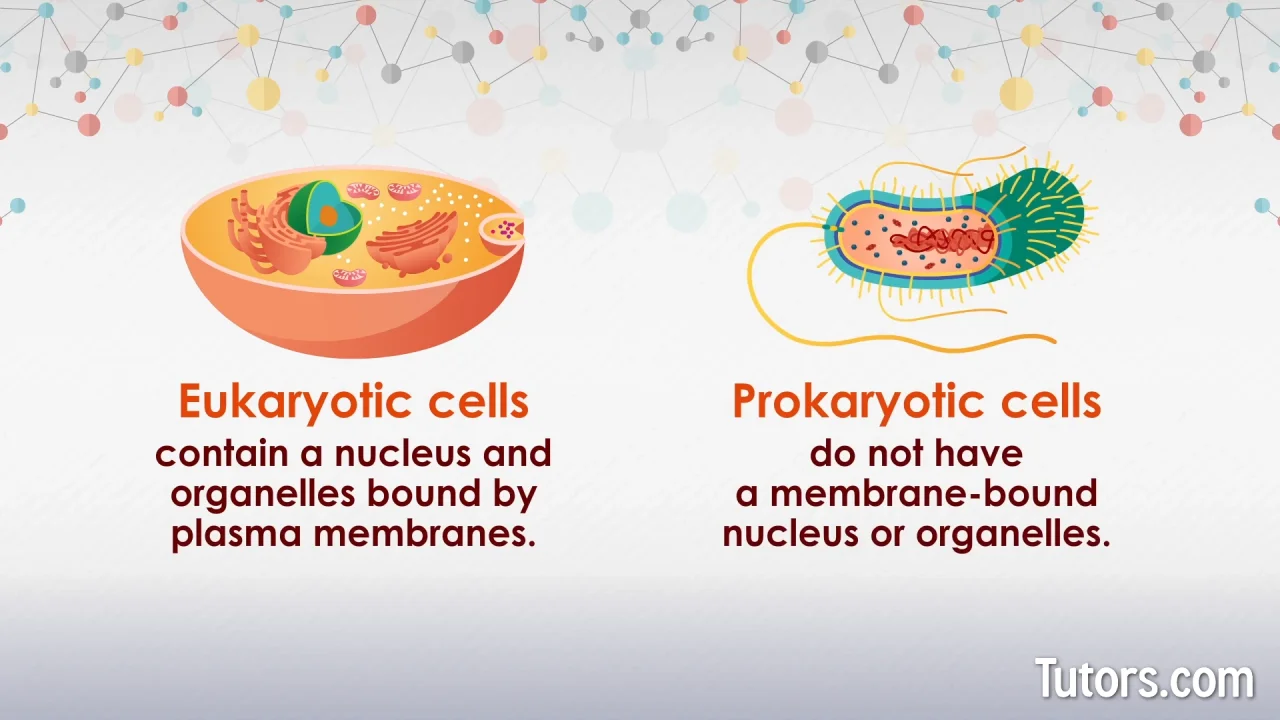The eukaryotic cell is compartmentalized. Their cells are smaller than eukaryotic cells.

Prokaryotic Vs Eukaryotic Cells Differences Examples
The chromosomes are usually circular in eukaryotes and usually linear in prokaryotes.

. They are called prokaryotes. Nearly every eukaryotic cell has mitochondria. Prokaryotes do not have a nucleus.
Eukaryotic cells are more complex than prokaryotes and the DNA is linear and found within a nucleus. Obligate anaerobes prokaryote organism that uses oxygen if it is present but doesnt need it. Have a variety of specialized compartments called organelles.
Like a prokaryotic cell a eukaryotic cell has a plasma membrane cytoplasm and ribosomes but a eukaryotic cell is typically larger than a prokaryotic cell has a true nucleus meaning its DNA is surrounded by a membrane and has other membrane-bound organelles that allow for compartmentalization of functions. Differences between prokaryotes and. The RNA primer is removed by ribonuclease H instead of a DNA.
Obligate aerobe prokaryote prokaryotes play a central role in many ____ _____. This means the genetic material DNA in prokaryotes is not bound within a nucleus. Both cell types contain DNA and ribosomes.
The key difference between eukaryotic and prokaryotic organisms is the presence and absence of a nucleus in their cells. Eukaryotes are much larger in size when compared with prokaryotic cells having a volume about 10000 times higher than prokaryotic cells. Prokaryotic cell range in size from 02 μm 20 μm in diameter.
The size of a prokaryotic cell ranges from 01 to 5 micrometres. Prokaryotes divide via using binary fission while eukaryotic cells divide via mitosis. Prokaryotes have less-complex cell organization and are generally smaller than eukaryotes.
The mature mRNA m. The size of Eukaryotic cells ranges from 10 μm 100 μm in diameter. MOST prokaryotes have cell walls that are extremely tough.
Prokaryotes also differ from eukaryotes in that they contain only a single loop of stable chromosomal DNA stored in an area named the nucleoid while eukaryote DNA is found on tightly bound and organised chromosomes. Eukaryotes have more origins of replication than prokaryotes. The difference is as follows.
Moreover eukaryotic cells contain a cell nucleus where the genetic material is. The main difference between prokaryotes and eukaryotes is with regards to a membrane-bound nucleus. Prokaryotic cells have no cell nucleus and internal membranous structures within the cytoplasm.
Prokaryotes have less-complex cell organization. Prokaryotes are usually much smaller than eukaryotic cells. Eukaryotes are more complex because they have organelles that are membrane bound such as the nuclei which contain their DNA.
The DNA is not tightly complexed with histones in eukaryotes. Which describes one difference between prokaryotic and eukaryotic DNA replication. Those that always have cytoskeleton are eukaryotic cells while prokaryotes are not.
Eukaryotes can be found as both unicellular and multi-cellular organisms. Eukaryotes include larger more complex organisms such as plants and animals. Eukaryotes are different from prokaryotes because of what is inside both cells.
Furthermore eukaryotes have membrane-bound organelles while prokaryotes lack membrane-bound organelles. Also eukaryotes have 80S ribosomes. Obligate aerobes eukaryote organism that is poisoned by oxygen.
The process of transcription of genes to synthesize the RNA corresponding to a gene is performed in the nucleus. No prokaryotic cell has a nucleus. In addition the DNA is less structured in prokaryotes than in eukaryotes.
These tiny organelles in the cell not only produce chemical. Only eukaryotes have membrane-bound organelles and a nucleus. Another major difference between prokaryotic and eukaryotic cells is that prokaryotic cells are exclusively unicellular while the same does not apply to eukaryotic cells.
In prokaryotic cells the true nucleus is absent moreover membrane-bound organelles are present only in eukaryotic cells. The statement eukaryotic cells contain organelles that are enclosed in membranes BEST describes a difference between prokaryotic cells and eukaryotic cells Option B. Eukaryotes have a true membrane-bound nucleus while prokaryotic lack a nucleus.
View the full answer. In prokaryotes DNA is a single loop while in Eukaryotes DNA is organized into chromosomes. Prokaryotic cells consist of a single cell ie they are unicellular.
Prokaryotic cells have no mitochondria. Some eukaryotes fungi plants have cell walls. Eukaryotic cells are formed of a number of membrane-bound and membrane-less organelles that all perform together to support the cells organization and function.
Eukaryotic cells boast their own personal power plants called mitochondria. The size of a eukaryotic cell can range from 5 to 100 micrometres. Do NOT have organelles.
Most noteworthy eukaryotes have a membrane-bound nucleus while the prokaryotes are without it. The most obvious difference between them is that prokaryotes have no nuclei but there are four major differences between a eukaryotic and prokaryotic cell. Virtually all the life we see each day including plants and animals belongs to the third domain Eukaryota.
Although some eukaryotes have satellite DNA structures called plasmids these are generally. The main difference between prokaryotic and eukaryotic cells lies in their structure. Most prokaryotes are unicellular and are either archaea or bacteria.
Cell division of prokaryotic cells is produced by binary fission. Faculatative anaerobesprokaryote organism that has oxygen. The organisms with prokaryotic cells are unicellular whereas those with eukaryotic cells are multicellular.
Transcription must conclude before translation begins. Prokaryotes are organisms made up of cells that lack a cell nucleus or any membrane-encased organelles. Prokaryotic cells and eukaryotic cells are the two types of cells that exist on Earth.
Eukaryotic cells can be either single-celled or have multiple cells ie unicellular or multi-cellular. Prokaryotes are unicellular in nature. On the other hand the eukaryotes can be given by mitosis or meiosis.
Eukaryotes contain nucleus and other organelles that Prokaryotes do not contain. Every eukaryotic cell has a nucleus.
What Are The Differences Between Prokaryotes And Eukaryotes Quora

Eukaryotes And Prokaryotes What Are The Similarities Differences And Examples Rs Science

Difference Between Prokaryotic And Eukaryotic Cells Fundamental Units Of Life Cbse Biology Youtube

Prokaryotes Vs Eukaryotes What Are The Key Differences Technology Networks
0 Comments